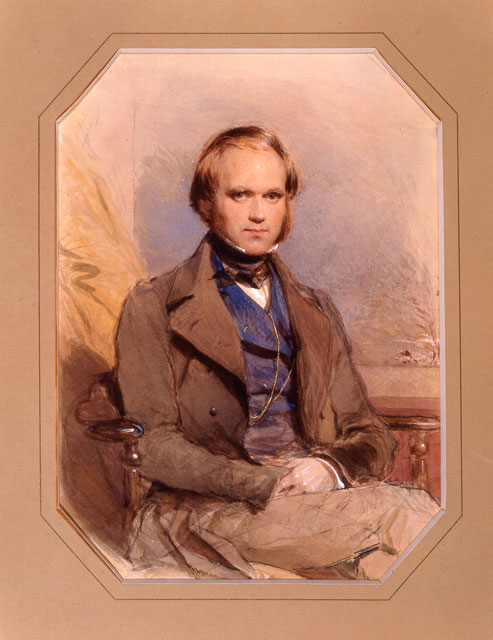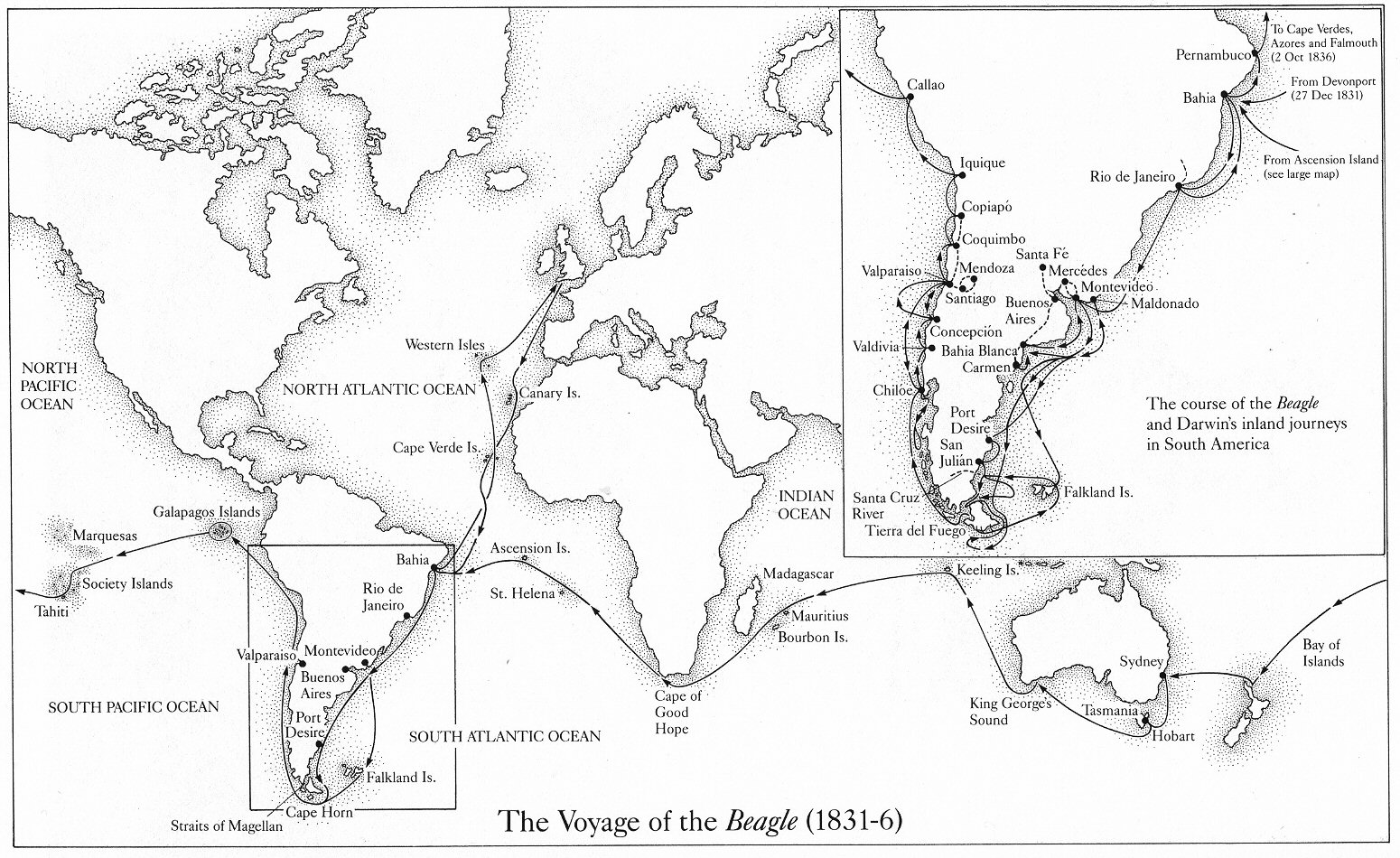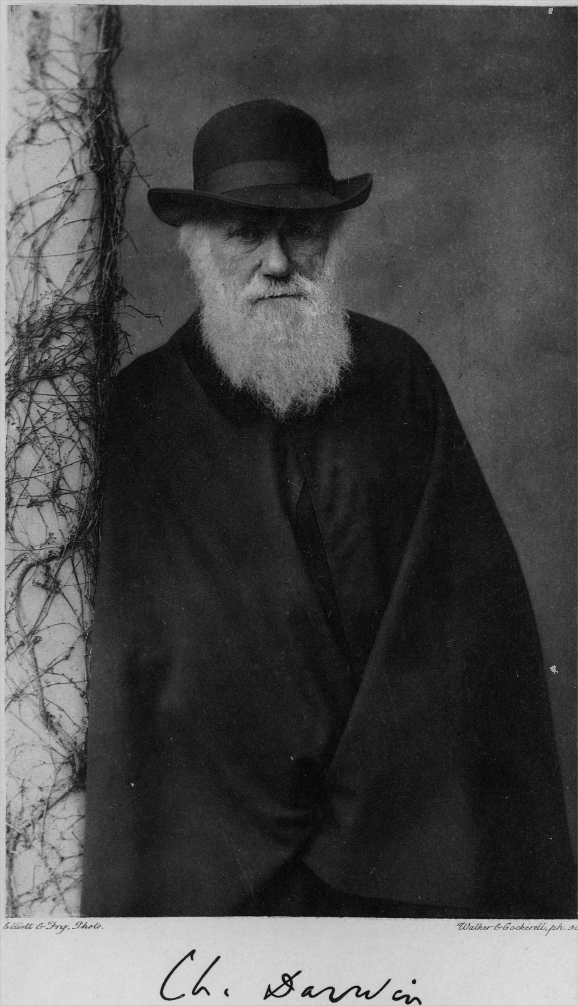


DARWIN AND THE NATURALISTS



Nothing in biology makes sense except in the light of
evolution.
- Theodosius Dobzhansky
NOTE:
This is the "LIVE" syllabus; it may not agree with the static version
on populi page. Check it weekly/freuqently for updates, particularly
on reading assignments
Darin and the Naturalists, BIO4223, Spring 2021, 2 credits, Mon,
Thurs 1:40-3:30 PM, FIRST 7 WEEKS, Room TBA
Kerry Woods (Dickinson 143, 440-4465, kwoods@bennington.edu,
office hours Tues 2-4, Wed, Fri 10-12)
READING ASSIGNMENTS:
Roughly half of our class time will focus on Charles Darwin's writings; we will read selections of his Voyage of the Beagle, and ALL of On the Origin of Species. . I recommend that you acquire a copy of 'Origin' so you can mark it up and have it on hand in class. However, Darwin's writings are all available on-line, so you can choose that option if you want. There were six editions of Origin published by Darwin in his lifetime, and there's no agreement on which is 'best'. A very inexpensive print version (ISBN-10 : 0451529065), based on the sixth edition, is available at Amazon and elsewhere, usually for less than $10. There are plenty of other versions, including some fancy annotated ones. I do NOT recommend using one of the facsimiles of the first edition; Darwin himself made a lot of substantive changes in the second edition and beyond. There is also an on-line 'variorum' edition, documenting all differences among editions, at http://darwin-online.org.uk/Variorum/.
The
rest of the class will involve briefer readings from the work of a
selection of naturalist-scientists from Darwin's time to (near) the
present. You will each be responsible for 'adopting'
one such writer. That will involve reading
extensively in their work (typically, one or two books or the
equivalent), and choosing selected passages (typically, a few
chapters) for the whole class to read. You'll then introduce
that writer to the class and lead a short discussion of the shared
chapters. I'll have more on format and expectations for this
later; for now, have a look at list of writers below and feel free
to start exploring them to see who you find most interesting.
- questions of fact
and historical context raised by the reading (DO feel free to
look things up -- but bring questions/comments to class, too);
- questions about intellectual context, with
particular
focus on understanding WHY writers thought as they did,focused on what
they did, etc.;
- aspects of particular relevance to current
thought/understanding either as precursor or contrast;
- and anything else that interests you and
might be interesting to other class members.
II. For your chosen writer/book(s), you will write brief critical review of the work. Think in terms of 1500 words or so minimum, and not a lot more than that. These should be similar in approach to the shorter log entries -- i.e., NOT simply summarizing what you've read, but focusing on and developint one or a few questions, ideas, thoughts of your own that derive from and relate to the reading. Your review, however, should be a more fully developed and coherent essay than your regular log entries, and it should take into account your broader reading of your chosen author, not just the chapters selected for class discussion. (Read some book reviews in the NY Times or Science or Nature if you want to get a sense of what I mean...). See the list at the end of this document for suggestions/examples of appropriate writers and works.
(TENTATIVE) READING ASSIGNMENTS:
Feb.
18: Gilbert
White, Natural History of Selborne.
One of the best-known early-modern works of observational natural
history, in press continuously for 230 years. Written in
'epistolary' form -- as a collection of letters (many apparently never
sent). Read 10-12 (or more) of the letters (any of them) compiled
in volume I -- any of them (Vol. II is mostly antiquities and
brief journal entries). Also browse this
website that has all of his daily journal entries:
http://naturalhistoryofselborne.com/ Be prepared to discuss.
How does White's approach to natural history strike you? How is it
like or unlike a modern scientist's approach? From reading White,
what is your sense of the intellectual and scientific discourse of the
time? Many available versions online:
https://archive.org/details/naturalhistoryof00whitrich/page/n7/mode/2up
https://www.biodiversitylibrary.org/item/80773#page/1/mode/1up You
can also get it for free for Kindle or or other ereader apps.
Feb.
22: Voyage, Chs. 6-8 (Voyage of the Beagle --
also published as 'Journal of Researches...' -- is available online in
many versions to read in browser, download as pdf, epub, etc.
http://darwin-online.org.uk/contents.html#researches
https://www.fulltextarchive.com/page/The-Voyage-of-the-Beagle/ or
your favorite source of ebooks. OR acquire hard-copy, e.g., ISBN-10
: 014043268X
is a good version.
Feb.
25: Voyage, 14-16
March
1: Voyage, 17-19
March
4: Origin, 1-3
March
8: Origin, 4-6
March 11 (NO CLASS)
March
15: Origin, 7,9-10
March
18: Origin, 11-13
March 22: Origin, 14: Faith, Jesus
Jesus: Henry Walter Bates: The Naturalist on the Rivers Amazon:
read Ch. 8 'Santarem'. Online
versions available at
https://www.biodiversitylibrary.org/item/276428#page/208/mode/1up
and google books:
https://www.google.com/books/edition/The_Naturalist_on_the_River_Amazons/41EyAQAAMAAJ?hl=en&gbpv=0
OR you can download a free kindle version, etc...
Faith: Ernest Henry Wilson: A Naturalist in Western China
(1913): Chs. 16-17. Ch 16 is
mostly anthropological; 17 more naturalist/botanical observation; make
sure you get into both because it would be worth thinking about the
contrast in purpose/style. (The whole book can be read/downloaded
here;
and there's a photo of author as frontispiece.). Faith also points
to a couple of pieces from his horticultural writing; maybe take a brief
look to get a sense: Ch.
1 (roses) in Aristocrats of the Garden;
Ch.
1 ('Their ancient lineage') from The Romance of our Trees.
March
25: Wills, Ethan
Ethan: Florence A. Merriam: Selections from "Birds Through the Opera Glass", "Birds of New Mexico", and "Handbook of Western Birds" (the last to 'peruse'). (all of these are available in full-text via google books or https://www.biodiversitylibrary.org/)
Wills: John Muir: Chapter 2 and Chapter
10 from "Travels in Alaska"
March 29: Kemly, Darby, Luca
Luca: Henry Thoreau, "Wild Fruits" from Faith in a Seed
Darby: J.J. Audubon, from "The Missouri River Journals": from Audubon and His Journals (ed. Maria R. Audubon). Start at beginning of the Missouri R. Journals -- page 447 (numbers in right margin) -- and read to 500 (they're short pages). (If you prefer a pdf version, check here; it's a big file)
Kemly: Rachel Carson, selections from "The
Edge of the Sea"
April 1: Thea, Srichchha, Maggie
Thea: Jane Goodall, read this chapter: ('Gombe')
Srichchha: Gene Stratton-Porter, Chapter 1 from "What I Have Done with Birds" (and browse some of the writing about specific birds), AND from "Music of the Wild", read some pages of Section II, Songs of the Fields (starts on P165; the density of text is very low -- lots of photos -- so maybe shoot for up to P200 or so (that's about 15 pages actual text). These are links to google book versions; if you'd like to download pdfs, you can find them here: Birds Music and probably other places.
Maggie: George Schaller, "The
Snow Leopard" from Stones of Silence. This is a
longish chapter, but a good choice; read as much as you can and
scan. Maggie says "focus on how he feels about the area/community
he's in, and how modern the book is".
Pliny the Elder (23-79):
A member of the 'equestrian' class ('landed gentry', not quite 'noble' -
roughly equivalent to the Darwins?) of imperial Rome, Pliny was a
lawyer, writer, military officer, and bureaucrat -- and, perhaps
something of an eccentric. Maybe the first to use the term
'natural history' as title of his best-known work Naturalis
Historia. Supposedly intended to cover all knowledge in 37 books,
but a number of the books are on areas we now consider 'natural history'
Vol III and IV, Books 8-27 are zoology and botany). They include a
lot his own observations as well as compilations of conveyed wisdom
(including a lot of weird lore, like sciapods and cynocephalus). Maybe
one of the most important surviving works of Roman times and a good
illustration of similarities and differences between classical
'scholarship' and modern 'science'. Pliny's curiosity killed him;
he got too close to the eruption of Vesuvius. Lots of versions
available online and in print.
https://web.archive.org/web/20161229101439/http://www.masseiana.org/pliny.htm
http://penelope.uchicago.edu/Thayer/e/roman/texts/pliny_the_elder/home.html
https://www.biodiversitylibrary.org/bibliography/18226#/summary
Pehr (Peter) Kalm (1716-1779):
Finnish-Swedish botanist, naturalist, and agricultural theorist. A
disciple of Linnaeus. After travels in eastern N.America (what was
then the frontiers of NY and PA), his Travels
in North America was a best seller, with extensive
commentaries on a lot of stuff (as much cultural, political, and
agricultural as natural history).
Alfred Russel Wallace (1823-1913); Close friend and contemporary of Bates (they traveled together for a time). Best known as 'co-discoverer' of natural selection. Either Narrative of Travels on the Amazon and Rio Negro or The Malay Archipelago would be good. Maybe supplemented by his essay on natural selection.
Jean-Henri
Fabre (1823-1915): French naturalist and entomologist whose
series of books on the lives of insects were huge popular hits.
Henry Walter Bates (1825-1892): The Naturalist on the Rivers Amazon. A younger contemporary of (and devotee of) Darwin and one of the great naturalist-explorers. First to describe what has come to be called 'Batesian mimicry' (think monarch and viceroy butterflies). Spent years traveling in South America collecting for rich Englishmen.
John Wesley Powell (1834-1902). Explorer, geologist, ethnographer, philosopher, Civil War hero -- and influential government bureaucrat... Appropriate works would be writings on exploration of Grand Canyon and region (he led the first excursion down the Colorado R. through the Canyon, and barely survived): The Exploration of the Colorado River and its Canyons (nice pdf here)and othersJohn Muir (1838-1914): Like Thoreau, a philosopher and impressionist, like Powell, a practical advocate and organizer -- but also an influential observer and thinnker about natural systems (particularly influential in geomorphology and glacier science). Several books include a lot of rigorous natural history observation; could also do a collection of essays. Check out lists on wikipedia article. Possibilities include Travels in Alaska, The Mountains of California, The Yosemite, etc.
Florence
Merriam Bailey (1863-1948): An early activist for
protection/conservation of birds and an influence in early days of the
Audubon Society. Recognized as an ornithologist, and wrote a
number of books to promote general awareness of birds and their lives.
Rachel Carson (1907-1964): Most famous for Silent Spring, but also a main-stream scientist wih some well-known natural-history books -- but you'd have to buy or get from library or otherwise find (because still on copyright): Under the Sea Wind, The Sea Around Us, A Sense of Wonder..
Edward
O. Wilson (1929-):
One of the most celebrated American biologist of last 60 years
with many books; tons of awards, several for his
writing. Several of his books are essentially
observational natural history behind his science
George Schaller (1933-): German-American Zoologist who did a lot of classic field-studies of charismatic megafauna (gorillas, lions, tigers, snow leopards, pandas...), and published a series of very popular books combining his field-work and science with conservation advocacy and a lot of cultural commentary.
Bernd
Heinrich (1940-): Another German-American who's done a lot of
classic work on animal (insects and birds) behavior in the wild,
including several books for general audience. His raven books
particularly well-known. Most of his career in New England.
Eccentric in a number of ways; probably a good example of a modern
version of several of the listed folks from 1800s.
Academic
Honesty/Plagiarism
The legitimacy of all scholarly work hinges on honesty of the scholar. This means, among other things: 1) Honesty about sources of ideas and information, with appropriate/explicit acknowledgement and citation; 2) Doing your own work as called for (I will try to be clear what sorts of collaboration and cooperation are okay) and always acknowledging collaborative work. 'Plagiarism' is not just unacknowledged use of other people's words. We will talk more about these standards in class, but legitimacy of scholarship generally, and of science in particular is completely dependent on their observance. Failure to observe them appropriately can have significant impact on your evaluation.
Statement on Inclusivity and Accommodations
Bennington College is committed to fostering the intellectual growth of all students, and to creating a learning environment where human cultural diversity is valued and respected. Students can expect a respectful, welcoming and inclusive classroom environment. I hope that all students in this course will openly share their own perspectives and respect the perspectives and contributions of other students and guests. If you feel that this goal is not being met, please donít hesitate to see me, or speak with a college officer from The Office of Diversity & Inclusion, Student Life, or Academic Services.At Bennington College, we understand that basic needs (food, housing, and wellness) have a direct impact on academic performance, all aspects of health, and overall success of students. If you have a personal circumstance or need that will affect your learning or performance in this course, please let me or your faculty advisor know so that we can direct you to available resources to help support you during the term. If you are
experiencing mental or physical health challenges that are significantly impacting your academic work I encourage you to speak with your faculty advisor or a member of Academic Services (academicservices@bennington.edu or 440-4400), and to connect with health and psychological services (440-4426 or 440-4451).
Bennington College provides reasonable accommodations to students with documented disabilities when such accommodations are requested and necessary to ensure equal access to College programs and facilities. If you believe you are entitled to an accommodation speak with Katy Evans, the Academic Services and Accommodations Advisor, about disability-related needs. If an accommodation is approved, you will receive a memo detailing specifics. It is your responsibility to provide me with the memo and discuss the implementation of accommodations. I will not be aware of your needs if you do not share this memo with me. Accommodations are not retroactive, and can't be implemented until you have discussed your needs with me.
-- KDW Jan 2021